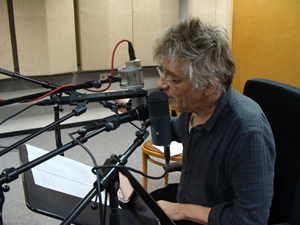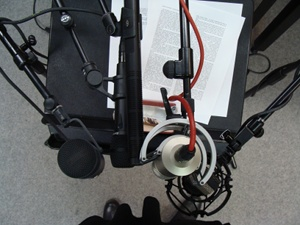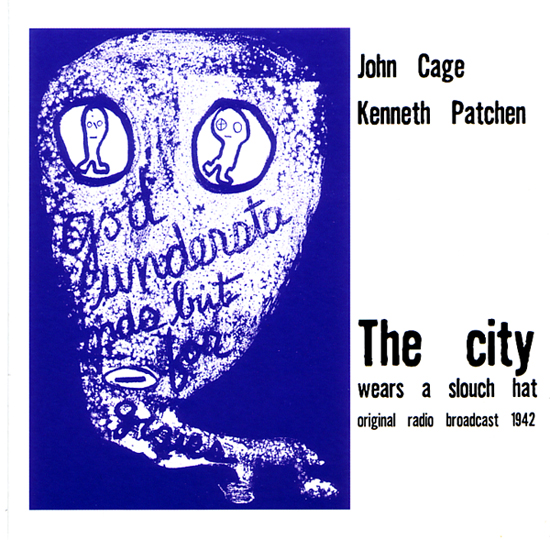On the occasion of John Cage’s 100th anniversary, the EBU Ars
Acustica group celebrates this seminal artist by summoning Cage’s
first work for radio: In 1942, Cage wrote a score for Kenneth
Patchen’s radio drama “The city wears a slouch hat”.
This text recounts the wanderings of a character called “The
Voice” through a generic city. Omniscient and omnipotent, The
Voice eavesdrops on conversations, picks up phones, and follows city
dwellers through small chunks of their lives.
John Cage intended to embed the text in a continuous flow of city
noises and sound effects. However, his ambitious 250 page score was
deemed impossible to realise by the Columbia Radio Workshop’s
technicians. Cage ended up writing a far more simple composition for
six percussion players, which was eventually premiered on WBBM CBS.
The first score for “The city wears a slouch hat” is lost.
However, this project paved the way for Cage’s preoccupation with
“arbitrary” noises and for his vision of a universal sound
composition. It already contains the initial spark for landmark works
such as “4’33”, “Silence”, and
“Roaratorio”.
The EBU Ars Acustica group invited contemporary artists to imagine what
the The city wears a slouch hat may sound like, if The Voice was
wandering through their respective cities today, and produce short
radio pieces of up to 10 minutes, based on Patchen’s and
Cage’s original ideas.
Kunstradio presents the results of the Ars Acustica Action for John
Cage in two programs (the first one on 18th August, 2012). With the
support of the EBU, a selection of the pieces will be published on CD.
*************
1) „Recorded in passing (Vorübergehend aufgenommen)“ by Stella Luncke & Josef Maria Schäfers
“Recorded in passing” is an assembly of about 3000 short
audio snippets recorded in Berlin's streets and parks during the past
year. The samples are allotted to seven audio players and played back
simultaneously at random order. Thus, a unique audio walk with endless
variations is created.
Musicians who never met play together while drunkards sing along,
police vans race past, pedestrians add their commentaries. We also hear
the sounds of playing children, barking dogs and in nocturnal peace.
And amongst all this two opera singers comment the current weather
conditions.
2) “Will you miss the lanes when they are gone?” by Peter Cusack
Deutschlandradio Kultur - Klangkunst
Producer: Marcus Gammel
The Panke River in Wedding, Berlin, lies under the flightpath into
Tegel airport. When there you become very aware not only of the
aircraft but also of the spaces between. As the planes diasappear
quieter sounds like water ripples, distant bells, children playing
amongst high buildings reveal themselves again only to be covered up a
few minutes later. Ones ears open and close in the rhythm imposed by
the passing flights.
‘Will you miss the Planes when they are Gone’ uses field
recordings from the area to celebrate the quieter sounds along the
river. It also alludes to the fact that Tegel will close in June 2012
and speculates on how the absence of the planes might effect people's
listening in the future.
Peter Cusack is a sound artist and (improvising) musician, and is also
active as a field recording artist (e.g. Baikal Ice, CD 2003) and a
teacher. He is a Senior Lecturer at the London College of Communication
and teaches and conducts research at other institutions, including the
University of the Arts, London. In his capacity as a musician, he
co-founded and directed the London Musicians’ Collective and was
a member of the group Alterations (with Steve Beresford, David Toop and
Terry Day). The focus of his current work – which he presents in
appearances and performances, radio and CD productions, lectures,
exhibitions and installations – is our man-made sound
environment; the works’ categorical context is shaped by the
conceptual approach of acoustic ecology.
3) “Chicago: The Voice” by Laurent Estoppey & Anne Gillot
Radio Suisse Romande - Espace 2
Piece for six instruments and tape
THE VOICE :
I am coming into your house with my hand outstretched. I am your friend. Do not be afraid of me
THE END
Being freely inspired by the work of Patchen &Cage, Anne Gillot and
Laurent Estoppey made a montage with different extracts of american
sitcoms's dialogues mixed with fieldrecordings of different public
places of Lausanne (Switzerland). So « The voice » is
traveling in its town.
Then they gave this piece to the six musicians of Babel Ensemble who
had to record a solo improvisation inspired by the piece, with the same
timing.
Anne Gillot and Laurent Estoppey made a final mix with all these
versions, respecting the linearity of the solos, playing with the
« accidental sound-meetings »
Ensemble: Babel
Noëlle Reymond, double bass
Luc Müller, drums
Antonio Albanese, guitar
Olivier Cuendet, keyboards
Laurent Estoppey, saxophone
Anne Gillot, bass clarinet
4) „Voice Gone From Fade City“ by Goran Vejvoda
Radio France – France Culture
Producer: Irène Omelianenko
Fade is a utopian city, where transmissions, signals and voices are
gone, and all that's left are traces of words and sounds. Months have
more days now, and every hundred years there is celebration to
commemorate Cage's radio play „The City Wears A Slouch Hat“.
Wide evolving echoes and reverberations sweep through the city
soundscape thus washing away the last vibrations that are suspended
within the air molecules.The resonance will become part of an audio
history on the verge of a vanishing point, that can be imagined but
only faintly heard in the distance. Metaphorical sentences oscillate
every now and again in eerie vacant locations, some voices are still
partially audible, cut up, trying themselves to recover bits and pieces
of meaning; the leftovers from a huge sonic feast. The radio antennas
are transmitting to the Nowhere-ians while the sound orchestra is on
it's way.
„Voice Gone From Fade City“ is a reminder that radio is
still a very open space where one can continue to experiment and also
pay tribute to the Cagian free spirit. Never forget, one chosen
paradigm, between many of his universal legacies: „To accept all
sounds as equally legitimate.“
Goran Vejvoda (*1956) is a musician/composer and visual artist. His
concerns span across various domains including: psychoacoustic
phenomena, silence, the origin and disappearance of sounds, their
invisibles traces, their socio-political implications, non-emotional
listening, the state of electro-acoustic music, future sounds, the
process and the final product, the compression generation, the
headphones culture, broadcasting. With his ‘modular’ unit
„Background“, he creates interdisciplinary performances
making use of new technologies, video, dance, happening or fashion. The
principle of adaptability, surprise and indeterminacy rules these
events. He develops an idiosyncratic body of work in the form of
concerts, exhibitions, records, writing, video and photography.
5) „kitsch in the title – on the technology of self criticism“ by Chris Mann
ORF Ö1 Kunstradio–Radiokunst
Sound engineer: Elmar Peinelt
Producer: Elisabeth Zimmermann
 
“An attempt to decentre,
to spatialise the voice, so it becomes more of an environment, less a
moment of authority.” (Chris Mann)
For Chris Mann (like Cage), language rejects distinctions between
music, sound and speech. His contribution to the EBU Ars
Acustica’s Cage project with the title „kitsch in the title
– on the technology of self criticism“ is based on a text
by Mann and was recorded and produced in March 2012 in the ORF Funkhaus
in Vienna. Various types of microphones were used in order to produce a
spatialisation of the voice, by locating the voice in different
environments simultaneously. Mann is interested in the microphone as a
tool for constituting and defining space – be it in the closed
environment of a radio studio, or in the buzzing streets of a city, a
setting John Cage proposed for his cityscape soundtrack for the initial
version of “The City Wears A Slouch Hat”.
|


 PLAY EXCERPT
PLAY EXCERPT
